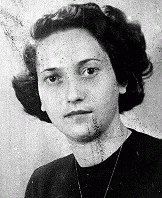You searched for: 谷歌seo霸屏投放靠谱【TG飞机:@bapingseo】摩纳哥谷歌留痕推广【TG电报:@bapingseo】資金程序源碼網站【Telegram:@bapingseo】csgo比赛押注巴黎人注册送39元欢迎您?20220707C9p2no.html
<< Previous | Displaying results 301-325 of 645 for "谷歌seo霸屏投放靠谱【TG飞机:@bapingseo】摩纳哥谷歌留痕推广【TG电报:@bapingseo】資金程序源碼網站【Telegram:@bapingseo】csgo比赛押注巴黎人注册送39元欢迎您?20220707C9p2no.html" | Next >>
-
Inge Auerbacher
ID CardInge was the only child of Berthold and Regina Auerbacher, religious Jews living in Kippenheim, a village in southwestern Germany near the Black Forest. Her father was a textile merchant. The family lived in a large house with 17 rooms and had servants to help with the housework. 1933-39: On November 10, 1938, hoodlums threw rocks and broke all the windows of Inge's home. That same day police arrested her father and grandfather. Inge, her mother and grandmother managed to hide in a shed until it was…
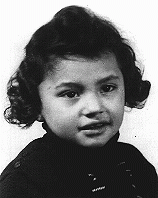
-
Feiga Kisielnicki
ID CardFeiga lived with her husband, Welwel, and their three children in the small, predominantly Jewish town of Kaluszyn, which was 35 miles east of Warsaw. The Kisielnickis were religious and spoke Yiddish in their home. Feiga was a housewife and her husband was a merchant who often traveled, by horse and wagon, to Warsaw on business. 1933-39: Germany recently invaded Poland, and several days ago, German forces fought Polish troops in a battle right here in Kaluszyn. Half the town, including Feiga's house, has…
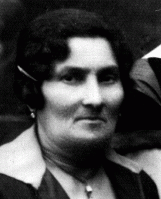
-
David J. Selznik
ID CardThe village in Lithuania where David grew up was located near the Latvian border. His father was a peddler. At age 6, David was sent to Ukmerge, a town known to Jews by its Russian name, Vilkomir, to study traditional Jewish texts at the rabbinical academy there. Six years later, David was called to return home to head the Selznik family because his father had died. 1933-39: David lost his job in 1933, so he left Lithuania and went to the United States and then Portugal. But in 1936 the Baltic states were…
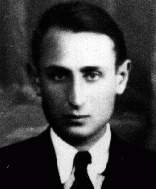
-
Nanny Gottschalk Lewin
ID CardNanny was the oldest of four children born to Jewish parents in the small town of Schlawe in northern Germany, where her father owned the town's grain mill. Nanny was given the Hebrew name Nocha. She grew up on the mill grounds in a house surrounded by orchards and a big garden. In 1911 Nanny married Arthur Lewin. Together, they raised two children, Ludwig and Ursula. 1933-39: Nanny and her widowed mother have moved to Berlin. They feared the rising antisemitism in Schlawe and hoped, as Jews, to be less…
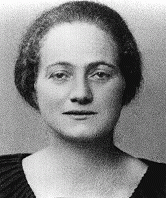
-
Welwel Rzondzinski
ID CardOne of six children, Welwel was born to Jewish parents living in the predominantly Jewish town of Kaluszyn, 35 miles east of Warsaw. His parents were religious, and they spoke Yiddish at home. Welwel's father was a bookkeeper for a large landowner. After Welwel's father died, his mother ran a newspaper kiosk in Kaluszyn. Welwel married when he was in his twenties and moved with his wife Henia to Warsaw. 1933-39: When war broke out three months ago, many Jews left Warsaw in a mass exodus towards the east.…
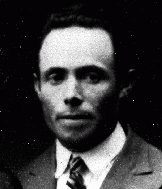
-
Fela Perznianko
ID CardFela was the older of two children born to Jewish parents living in Zakroczym, a town on the Vistula River near Warsaw. Her father was a respected attorney. As a young woman, Fela worked as a hat designer in Warsaw, until she married Moshe Galek when she was in her late 20s. She moved to the nearby town of Sochocin, where her husband owned a pearl-button factory. Fela and Moshe raised four daughters. 1933-39: In 1936 the Galeks moved to Warsaw, attracted by the city's cultural life. When Germany invaded…
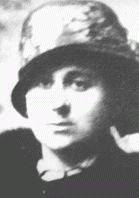
-
Ethel Stern
ID CardEthel was born to a Jewish family living in Warsaw. When she was 9, her family moved to the town of Mogielnica, about 40 miles southwest of Warsaw. Ethel's father spent much of his time studying religious texts. His wife managed the family liquor store. Ethel attended public school during the day and was tutored in religious studies in the evening. 1933-39: Ethel had always wanted to be a teacher. At age 14, after attending religious school in Lodz, she began to teach in the town of Kalisz, where her…
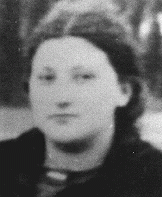
-
Abraham Lewent
ID CardAbraham was born to a Jewish family in the Polish capital of Warsaw. His grandfather owned a clothing factory and retail store, which his father managed. Abraham's family lived in a Jewish section of Warsaw and he attended a Jewish school. Warsaw's Jewish community was the largest in Europe, and made up nearly one-third of the population of the city. 1933-39: After the bombardment of Warsaw began on September 8, 1939, Abraham's family had little to eat. The stores had been reduced to rubble; they had no…
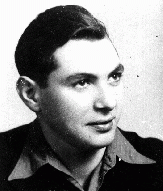
-
Yosel Coller
ID CardOne of six children, Yosel was raised in a religious Jewish family in Lodz, an industrial city in western Poland. His father was a businessman. At the age of 6, Yosel began attending a Jewish day school. His two older sisters attended public school in the morning and religious school in the afternoon. Yosel spent much of his free time playing soccer with his brothers. 1933-39: Yosel's family lived in a modest house in the northern section of Lodz. He went to a Jewish day school and had many friends there.…
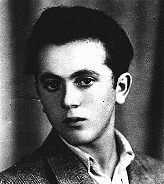
-
Benjamin Bornstein
ID CardBenjamin and his younger brother Zigmush were born to Jewish parents in the industrial city of Lodz. Lodz was Poland's second biggest city before the war, and one-third of its inhabitants were Jewish. Benjamin's father, Moshe, owned a candle factory, and his mother, Brona, was a nurse. 1933-39: In 1939, as Benjamin began the third grade, the Germans occupied Lodz. Jews were forbidden to ride buses, and were ordered to wear yellow stars. Because the Germans sometimes grabbed Jews off the streets for forced…
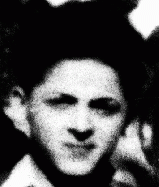
-
Machla Spicehandler Braun
ID CardRaised in Lowicz, Poland, in a religious Jewish family, Machla moved to Lodz when she married Jacob Braun. Her husband worked as a businessman and real estate investor. He became the landlord for an apartment building where he and his family also lived. Machla, a housewife, cared for their five children, who ranged in age from 5 to 15. 1933-39: Machla worked as a volunteer for the Zionist cause. The Brauns were a close family, and Machla's daughters Lena and Eva held their weddings in the Braun's large…
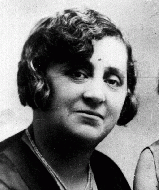
-
Yakob Braun
ID CardYakob's town of Wloclawek was located on the Vistula River. He and his brother Abraham studied Hebrew and German in addition to Polish. Yakob met his bride Machla through a Jewish matchmaker, and after marrying they lived in Lodz. Yakob ran the family textile business until 1938, when he invested in real estate. He became landlord of an apartment building, where he and his family also lived. 1933-39: When the Nazis expelled the Polish Jews from Germany in 1938, Yakob established a relief organization in…
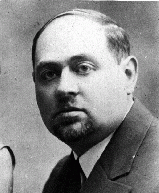
-
Hela Szabszevicz
ID CardHela was born in the industrial city of Lodz. She grew up speaking Polish and Yiddish, and learned German and Russian at secondary school. After completing school she married, and moved with her husband to a house on her father-in-law's large estate in the nearby town of Ozorkow. Hela was active in planning events for Jewish organizations. She and her husband, Israel, had two daughters. 1933-39: After German troops occupied Ozorkow in 1939, Hela and her family were forced out of their home and moved in…
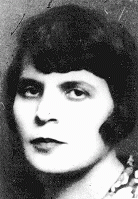
-
Herschel Rosenblat
ID CardHerschel was the youngest of three sons born to Yiddish-speaking Jewish parents. When Herschel was a child, his family moved to Radom, an industrial city which had a large Jewish population. By 1930, Herschel had finished his schooling and was helping in his father's shoemaking business. With the help of a friend, he later found a full-time job as a house painter. 1933-39: Herschel's career as a painter was interrupted for two years when he was drafted into the Polish cavalry at the age of 20. When…
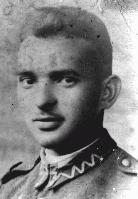
-
Gerda Blachmann
ID CardGerda was an only child of Jewish parents. They lived in Breslau, a large industrial city on the Oder River. Before World War II, Breslau's Jewish community was the third largest in Germany. Her father worked as a salesman for a large hardware and building materials company. Gerda attended public school until age 9 when she was admitted to a Catholic girls' school. 1933-39: Gerda walked through the city to see the aftermath of a pogrom. The windows of Jewish shops had been shattered. A torched synagogue…
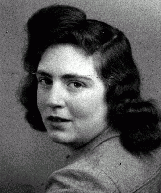
-
Zigmond Adler
ID CardZigmond's parents were Czechoslovakian Jews who had emigrated to Belgium. His mother, Rivka, was a shirtmaker. She had come to Belgium as a young woman to find a steady job, following her older brother, Jermie, who had moved his family to Liege several years earlier. In Liege, Rivka met and married Otto Adler, a businessman. The couple looked forward to raising a family. 1933-39: Zigmond was born to the Adlers in 1936, but his mother died one year later. His father remarried, but the marriage didn't last.…
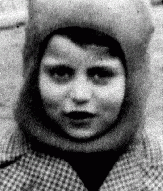
-
Renate Guttmann
ID CardRenate, her twin brother, Rene, and their German-Jewish parents lived in Prague. Shortly before the twins were born, Renate's parents had fled Dresden, Germany, to escape the Nazi government's policies against Jews. Before leaving Germany to live in Czechoslovakia, Renate's father, Herbert, worked in the import-export business. Her mother, Ita, was an accountant. 1933-39: Renate's family lived in a six-story apartment building along the #22 trolley line in Prague. A long, steep flight of stairs led up to…
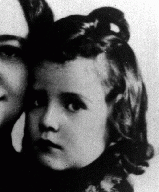
-
Henoch Kornfeld
ID CardHenoch's religious Jewish parents married in 1937. His father, Moishe Kornfeld, and his mother, Liba Saleschutz, had settled in Kolbuszowa, where Henoch's mother was raised. There, Liba's father bought the newlyweds a home and started his new son-in-law in the wholesale textile business. 1938-39: Henoch was born in late 1938, and was raised among many aunts, uncles and cousins. Around Henoch's first birthday, Germany invaded Poland and soon reached Kolbuszowa. Polish soldiers on horses tried to fight…
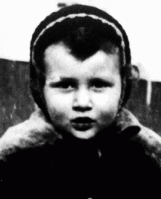
-
Lidia Lebowitz
ID CardThe younger of two sisters, Lidia was born to Jewish parents living in Sarospatak, a small town in northeastern Hungary. Lidia's parents owned a successful dry goods business. At the time, ready-made clothes were still rare in the countryside. Townspeople and local farmers would purchase fabric at the Lebowitz store and then take it to their tailor or seamstress to be sewn into clothes. 1933-39: Lidia was 2 when her Aunt Sadie, who had immigrated to the United States many years earlier, came to visit…
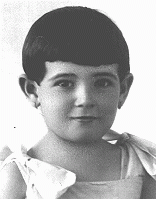
-
Lisl Winternitz
ID CardLisl was the youngest of two children born to a Jewish family in the Czechoslovakian capital of Prague, a city with a Jewish community that dated back to the eleventh century. Lisl's family lived on Karlova Street in the Karlin district of the city. Lisl's father owned a wholesale business that sold floor coverings. 1933-39: Lisl was 12 when, on March 15, 1939, the German occupation forces entered Prague. She went to school that day and a teacher shouted at her, "You dirty, filthy Jew," and then spat in…
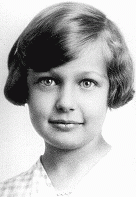
-
Helene Melanie Lebel
ID CardThe elder of two daughters born to a Jewish father and a Catholic mother, Helene was raised as a Catholic in Vienna. Her father died in action during World War I when Helene was just 5 years old, and her mother remarried when Helene was 15. Known affectionately as Helly, Helene loved to swim and go to the opera. After finishing her secondary education she entered law school. 1933-39: At 19 Helene first showed signs of mental illness. Her condition worsened during 1934, and by 1935 she had to give up her…
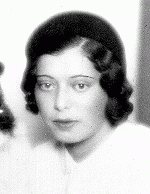
-
Joseph Muscha Mueller
ID CardJoseph was born in Bitterfeld, Germany, to Roma ("Gypsy") parents. For reasons unknown, he was raised in an orphanage for the first one-and-a-half years of his life. At the time of Joseph's birth, some 26,000 "Gypsies"—members of either the Sinti or Roma tribes—lived in Germany. Though most were German citizens, they were often discriminated against by other Germans and subjected to harassment. 1933-39: At age one-and-a-half, Joseph was taken into foster care by a family living in Halle, a city some…
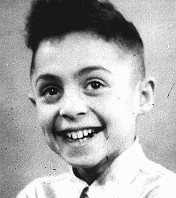
-
Gregor Wohlfahrt
ID CardGregor was born in a village in the part of Austria known as Carinthia. During World War I, he served in the Austro-Hungarian army and was wounded. Raised a Catholic, Gregor and his wife became Jehovah's Witnesses during the late 1920s. Gregor supported his wife and six children by working as a farmer and quarryman. 1933-39: The Austrian government banned Jehovah's Witness missionary work in 1936. Gregor was accused of peddling without a license and briefly jailed. When Germany annexed Austria in 1938,…
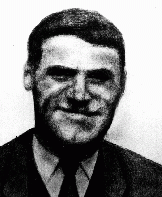
-
Jan-Peter Pfeffer
ID CardJan-Peter's father, Heinz, was a German-Jewish refugee who married Henriette De Leeuw, a Dutch-Jewish woman. Frightened by the Nazi dictatorship and the murder of Heinz's uncle in a concentration camp, they immigrated to the Netherlands when Henriette was nine months pregnant. They settled in Amsterdam. 1933-39: Jan-Peter was born soon after his parents arrived in the Netherlands. He was 18 months old when Tommy, his baby brother, was born. In 1939 the parents and brother of Jan-Peter's father joined them…
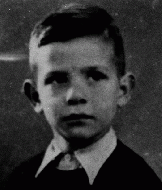
-
Yona Wygocka Dickmann
ID CardYona was the eldest of four children in a working-class Jewish family. The family lived in the Jewish section of Pabianice. Yona's father sold merchandise to Polish stores. When the Poles could not pay him for his goods, they would give him food for his family. It was a difficult life in Pabianice, but Yona's family was very close, and many relatives lived nearby. 1933-39: After war began in September 1939, the Germans set up a ghetto in Pabianice in Yona's neighborhood. Yona and all her extended family…
